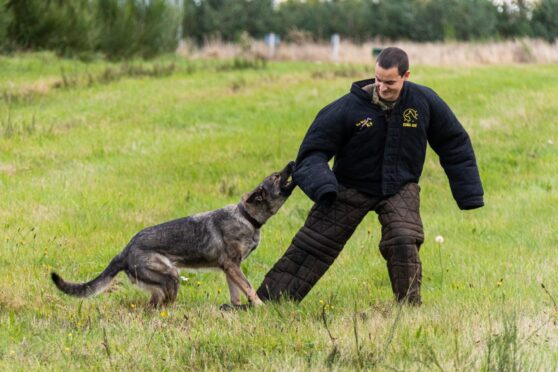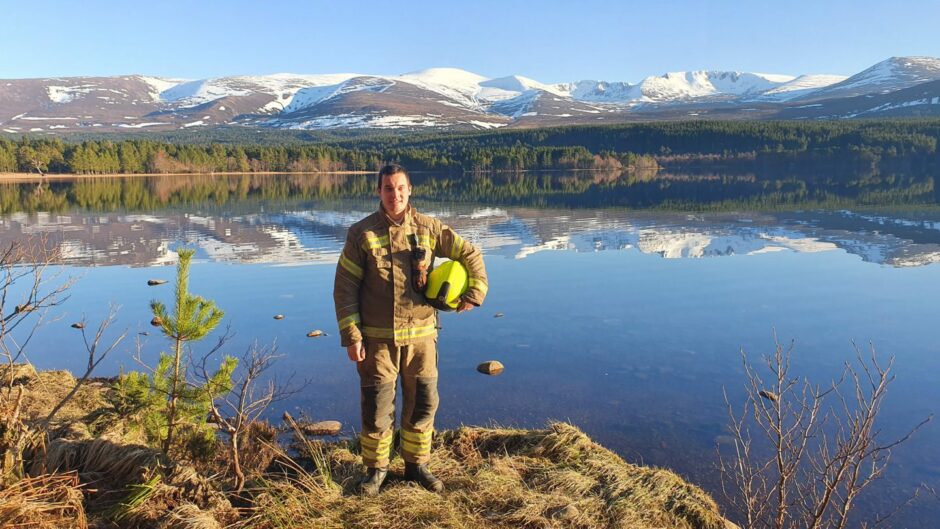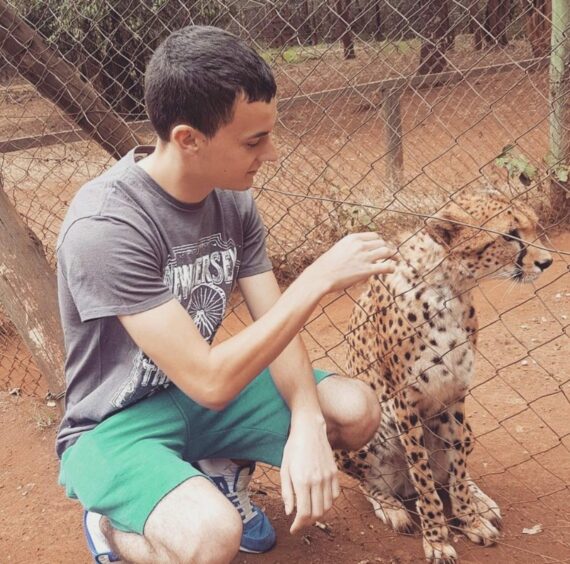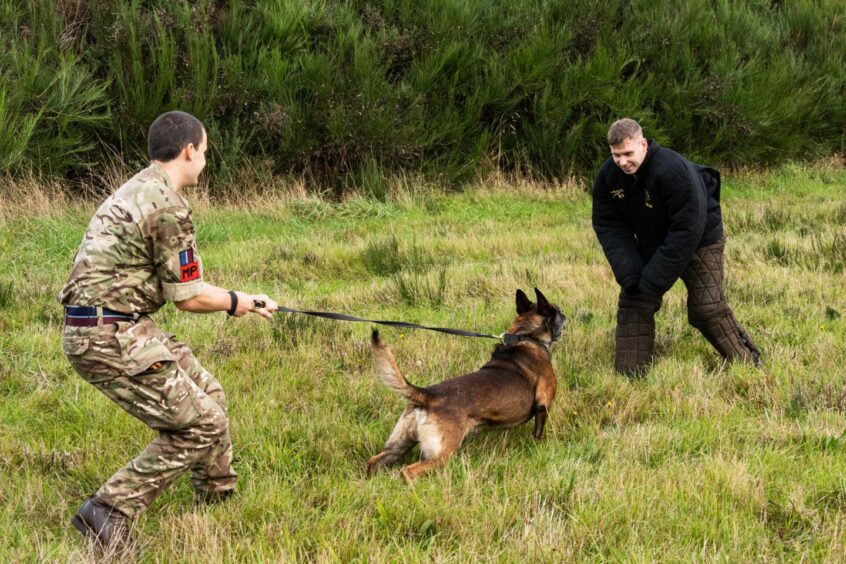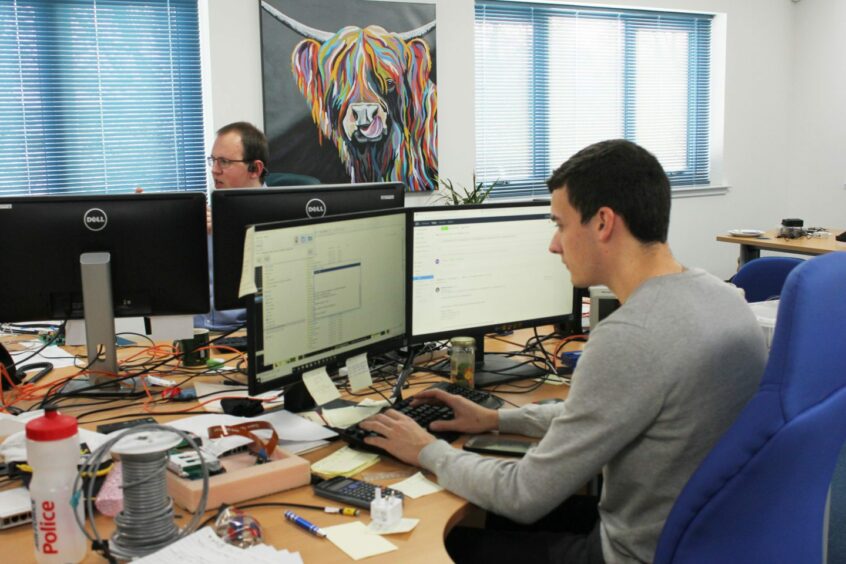What’s it really like to be chased by an attacking police dog? Just ask Corporal Kyle McRobert as he has experienced this – and so much more – as a Police Reservist with the Royal Air Force.
-
Some Press and Journal online content is funded by outside parties. The revenue from this helps to sustain our independent news gathering. You will always know if you are reading paid-for material as it will be clearly labelled as “Partnership” on the site and on social media channels.
This can take two different forms.
“Presented by”
This means the content has been paid for and produced by the named advertiser.
“In partnership with”
This means the content has been paid for and approved by the named advertiser but written and edited by our own commercial content team.
Kyle from Aviemore, has been serving as a part-time RAF Reservist for more than seven years and has recently been promoted. In this time, the role has brought him many exciting opportunities.
It all began on April 1, 2015, the day he signed up which was coincidentally, the anniversary of the RAF. Since then, Kyle, 28, has grabbed every opportunity the RAF has given him – despite having a full-time role in IT and a second part-time job as a retained firefighter!
RAF Reserves training
Kyle explained what attracted him to the RAF: “I was still studying engineering at Heriot Watt University when I signed up. I could have been a gunner or police reservist.
“I chose to become a police reservist because they have a lot of roles to choose from, not just law enforcement and arresting people, including dog handling, cyber security, air transport security and protective security.
“So I did all my basic training – which involved learning how to fire a rifle and running about fields – and my Phase Two training within the first year while studying at uni. It fitted in nicely as training was mostly during weekends.
“Then I got my warrant card, in 2016, the year I finished uni – and I was allowed to go out into the big open world and actually do tasks with the Air Force.”
After a spell doing general police work, Kyle specialised in air transport security which took him to on his first posting abroad, to Kenya!
He said: “I was there to process the army on and off flights at their main training base. It was interesting to see some of the items people try to take out the country, like bullet cases.”
Travel the world as a Police Reservist with RAF
During the downtime in Kenya, Kyle and his RAF colleagues experienced a safari, which was a memorable experience.
He added: “We went to an animal orphanage, I have a great photo of me petting a cheetah, which was purring! That was my favourite part of that trip.”
Next, he decided to mobilised as a full-time RAF reservist as a dog handler. This was the perfect role for Kyle who has always wanted a canine companion – and so he followed in the footsteps of his late great uncle Gordon who was an RAF dog handler.
He said: “I love dogs, but because of work, I cannot have one. It wouldn’t be fair on them. So, instead, I did a three-week dog handling course.
“I put on the full padded suit and was chased. Running and told not to look back at the dog, I could hear the its footsteps – like a small horse galloping behind me – then its jaw latched on to my arm. I could feel the pressure on my arm of it squeezing. Even though I had a lot of padding, it’s surprising how strong these dogs are.”
Kyle, who now helps with dog training at RAF Lossiemouth, has worked with German Shepherds, Belgian Malinois and Dutch Herders.
“I have handled about five or six, and been licenced with two, and every one of them has been a German Shepherd, my favourite breed.”
Visit to Falklands “brought it home”
On another of his postings as a dog handler, Kyle found himself in the Falklands. The visit was a real eye-opener for the young reservist and it made a lasting impact on him.
“We were patrolling the base out there, where the typhoons and quick-alert jets are kept. On our days off, we went on battlefield tours and we realised that war wasn’t that long ago. We saw left over equipment from the war, like machine gun tripods and soles of shoes. It does bring it home.
“We also went to the top of Mount Harriet where there is a memorial cross. We met an old guy with a green beret up there and assumed he had something to do with war. It turned out it was Captain David Wheen, the officer in command of the British battalion who fought against Argentine forces in the Battle of Mount Harriet – he was there visiting with his family when we were there!
“It brings it home.”
Now reflecting on his seven years of Air Force experience, Kyle, who signed up to be a reservist at 21, admits he has matured faster and has “a better insight into what war is actually like”.
“I have never been to a conflict (which I am not going to complain about) but this has given me an appreciation of what people went through and what happened in the past.”
How to become an RAF Police Reservist
He wants to encourage people of all ages and background to consider becoming a police reservist with the RAF and apply: “There are lots of opportunities – I have no plans to leave after nearly eight years.
“If you are considering applying, just go for it. When you break it down, it’s only 27 days a year and only two weeks holiday that you need to use as the rest is weekends.
“It’s not that much of a commitment, but you get so much out of it.
“Reserves bring a lot of life skills and points of view to the Air Force from their civilian jobs. And you can find a role for whatever personality type you have.”
Fortunately, Kyle’s employer is very supportive of his commitment to the RAF reserves, although his day job in IT is perhaps “a little bit less exciting” as his two part-time roles.
Kyle currently works as a senior hardware engineer with a tech company in the Highlands.
“Being the in the Air Force police and a retained firefighter keeps me sane,” Kyle laughed.
Reasons for joining
Flight Sergeant Andy Stephens is part of the recruitment team tasked with taking on more reserves. As someone who has served as a regular with the RAF, he also knows what’s involved.
He said: “We are looking for all genders, aged from 18 to 54 to join who want to do something different with their spare-time, wish to better themselves and make a difference. Individuals need to be reasonably fit (you don’t have to be Olympic standard), good communicators, work well as an individual and in a team, follow direction, be self-disciplined and motivated to achieve goals.
“People should become a reservist to gain or improve confidence, leadership and communication skills, work with like-minded people to achieve tasks. Reservists undertake assignments that are unavailable in any other job and have respect for all personnel for who they are (we all bring something to the table regardless of experience).
“The majority of people have a preconceived ideas of what the reserves are like and do and they are probably far from the actual reality. We recommend people get in touch and attend either a face-to-face presentation or online to gain a better understanding.”
The RAF is recruiting reserves at RAF Lossiemouth now.
Do you have what it takes to sign up?
Here are just some reasons to do it today:
- Gain qualifications
- Enjoy competitive benefits
- Undertake Adventure Training
- Experience specialist training
- Travel the world – and all while being paid!
Find out more about what becoming an RAF Reserve involves. Discover what roles 2622 Highland Squadron can offer and about what the recruitment process is like. You can also find out what to expect when you are qualified and the financial benefits, as well as opportunities to mobilise at home and abroad, before you apply.
